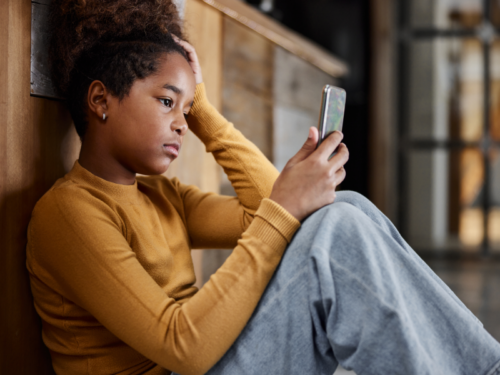
Table of Contents
Can You Have Postpartum Depression After Miscarriage?

Written By: Sarah duRivage-Jacobs

Clinically Reviewed By: Dr. Don Gasparini
August 21, 2023
7 min.
1 in 5 pregnancies may end in miscarriage. For 10 to 15% of those who’ve had miscarriages, depression may come next. Here’s what to know and how to feel better.
Learn more about our Clinical Review Process
Table of Contents
Although people don’t talk about it nearly enough, miscarriage—also known as pregnancy loss—is extremely common. Up to 1 in 5 pregnancies confirmed by a healthcare provider will end in miscarriage. The vast majority (80%) of those losses are in the first trimester, but miscarriage at any stage of pregnancy (also known as stillbirth after 20 weeks) can be an emotionally distressing experience.
But do depressive feelings after a miscarriage mean someone also has postpartum depression (a mood disorder affecting some people at birth)? What’s the difference between the two experiences? And what are possible signs of depression after miscarriage? Below are your answers, plus resources for support after pregnancy loss.
Can you have postpartum depression after miscarriage?
Postpartum depression, which is now more often classified as peripartum (around the time of birth) depression, can impact anyone who is pregnant or was recently pregnant. Because peripartum depression can begin in pregnancy, giving birth is not a requirement for a diagnosis. So, yes—you can have peripartum depression before or after a miscarriage.
Peripartum depression, however, doesn’t fully capture the complex emotional experience of having a miscarriage, pregnancy loss, or stillbirth. Pregnancy on its own can bring depressive feelings due to hormonal changes, financial struggles, and a potential lack of social support. After a loss, though, additional feelings of depression and grief can emerge—often very comparable to grief from other kinds of major loss.
International data suggests that, after a miscarriage, approximately 30 to 50% of birthing people may experience anxiety—and 10 to 15% may experience depression. These feelings can last for up to four months. Miscarriage has also been associated with symptoms of post-traumatic stress disorder (PTSD). One 2016 study from the U.K. found that 40% of people who’d experienced a miscarriage or ectopic pregnancy (when a pregnancy develops outside of the uterus) may have PTSD symptoms within three months of their loss.
More recent research—published in 2021—identified similar associations between miscarriage, depression, anxiety, PTSD, and suicidality. One study cited in the 2021 paper found that 6% of the 537 participants who had miscarriages met the clinical criteria for moderate or severe depression, 17% for moderate or severe anxiety, and 18% for PTSD.
What are possible signs of mental health issues after a miscarriage?
Depression
PTSD
Anxiety disorders
Suicidality
Persistent low moods, loss of interest in enjoyable activities, guilt, substance use, sleep issues, altered eating habits, physical discomfort, and risky behaviors may be symptoms of depression after a miscarriage.
After a miscarriage symptoms of PTSD may include, Flashbacks, nightmares, re-living emotions, and avoiding triggers like pregnant people and babies.
Post-miscarriage anxiety disorder symptoms may include, restlessness, difficulty concentrating, exhaustion, physical discomfort, emotional instability, and overwhelming feelings.
People who’ve had miscarriages may also be more likely to self-harm or experience suicidality. If you’re experiencing suicidal thoughts and think you’re in danger of harming yourself, this is a mental health emergency, and you should contact 988.
After a loss at any stage of pregnancy, birthing people are at higher risk of experiencing the following mental health-related symptoms within 12 months.
Symptoms of depression
Commonly reported symptoms of depression include:
- Persistently low moods
- Loss of pleasure or interest in formerly enjoyable activities
- Feelings of guilt or worthlessness
- Increased use of substances
- Sleep problems
- Changes to eating habits
- Unexplained aches and pains
- High-risk behaviors (like speeding, not following safer-sex practices)
Symptoms of PTSD
The following PTSD symptoms may be more common among people whose symptoms were caused by miscarriage:
- Flashbacks
- Nightmares
- Re-experiencing feelings from the loss
- Avoidance of triggers (pregnant people, babies)
Symptoms of anxiety disorders
Commonly reported symptoms of anxiety disorders include:
- Feelings of restlessness or feeling wound-up or on edge
- Difficulty concentrating
- Constant exhaustion
- Feeling sick all the time
- Unexplained aches and pains
- Difficulty controlling emotions
- Feelings of overwhelm
In addition to the disorder-related symptoms above, people who’ve had miscarriages may also be more likely to self-harm or experience suicidality. If you’re experiencing suicidal thoughts and think you’re in danger of harming yourself, this is a mental health emergency, and you should contact 988, The Suicide & Crisis Lifeline.
Join the Charlie Health Library
Get mental health updates, research, insights, and resources directly to your inbox.
You can unsubscribe anytime.
How can mental health after a miscarriage impact future pregnancies?
People who experience miscarriages may have more symptoms of anxiety and depression during and after future pregnancies. If there’s more than one loss, these feelings are more common and more likely to continue after pregnancy.
A 2011 study with more than 13,000 English women, 21% of whom had a prior loss, revealed the following statistics:
- At 18 weeks of pregnancy, around 13% of women who hadn’t experienced a prior loss had depressive symptoms. Among women with a history of one loss, that percentage rose to 14%. Among those with a history of two losses, 20% had depressive symptoms.
- At 33 months after the participants gave birth, around 12% of women who hadn’t experienced a prior loss had depressive symptoms. Among women with a history of one loss, 14% had symptoms. Among those with a history of two losses, 20% had symptoms.
Although perinatal mental health issues are more common after a miscarriage, seeking out support from peers and professionals can help you better prepare for and manage symptoms that come up now or later.

How to cope with depression after a miscarriage
Anyone who’s had a miscarriage deserves compassionate support and understanding as they heal from their loss. Here are some recommendations that can help you cope, process, and move through pregnancy loss.
1. Find a pregnancy loss support group
As isolating as having a miscarriage can feel, there are many support groups and online communities geared towards connecting people with similar experiences.
Here’s a list of resources for peer support after a pregnancy loss:
- Grieve Out Loud
- Miscarriage Matters
- Postpartum Support International: Loss and Grief
- Return to Zero: H.O.P.E.
- SHARE: Pregnancy and Infant Loss Support, Inc
2. Work with a therapist who specializes in miscarriage
Several therapeutic modalities have been recommended for people who’ve experienced miscarriage or pregnancy loss—cognitive behavioral therapy (CBT) chief among them.
CBT is a commonly used therapeutic modality for treating people with mental health challenges because of a miscarriage or pregnancy loss. In CBT, people learn to identify and change negative patterns of thoughts and behaviors that contribute to mental health issues. Within the context of miscarriage, this may look like reframing negative thoughts related to fears of never becoming a parent or being at fault for the loss (which is almost never the case).
In 2011, researchers published the results of a randomized controlled trial investigating the efficacy of internet-based CBT for people who’ve experienced miscarriage. The participants who went through the internet-based CBT program had significant improvements in depression, grief, post-traumatic stress, and broader mental health—and the positive findings remained when the researchers followed up after three months.
CBT is also a recommended treatment for complicated grief, which the American Psychological Association defines as intense, prolonged, delayed, or absent grief.
3. Practice mindfulness-based exercises
There’s a growing body of research exploring mindfulness-based interventions for people who’ve had miscarriages. Put simply, mindfulness is the ability to stay present, aware, and in the moment. Mindfulness-based interventions may incorporate meditation or other mindfulness-based exercises to help people self-regulate and remain open and nonjudgmental toward their experiences.
Research shows that mindfulness-based interventions may be similarly effective as CBT for people experiencing mental health issues after miscarriage. Like CBT, mindfulness-based interventions have also been associated with improved mental health outcomes for people with complicated grief.
4. Rewrite your “reproductive story”
Whether people are aware of them or not, everyone has deeply held beliefs and expectations about parenthood. If those beliefs or expectations—the “reproductive story”—don’t align with reality, miscarriage can feel like an even bigger loss than the pregnancy itself.
Rewriting the “reproductive story” to encompass the loss experienced and work toward a new positive ending can help people, with the support of their therapist, normalize their situation and feel more in control. The approach was coined by psychologists Martha Diamond, PhD and David Diamond, PhD.
Back to basics: What is postpartum depression?
As mentioned, the American Psychiatric Association now calls “postpartum depression” peripartum depression. The term specifically refers to depressive feelings during pregnancy or after giving birth. 1 in 7 pregnant or postpartum people may experience peripartum depression.
Peripartum depression is more intense and severe than the short-lasting “baby blues,” which up to 70% of new parents may experience due to hormonal changes after giving birth.
Common symptoms of peripartum depression include:
- Loss of pleasure or interest in formerly enjoyable activities
- Changes to eating habits
- Anxiety or panic attacks
- Racing, scary thoughts
- Feelings of guilt, worthlessness, or self-blame
- Excessive agitation, anger, or irritability
- Mood swings
- Misery
- Sadness and long periods of uncontrollable crying
- Sleep problems
- Disinterest in family and friends
- Difficulty concentrating, remembering, or making decisions
- Thoughts of self-harm
If you’ve been dealing with the above symptoms for more than two weeks, it’s important to connect with mental health resources and get the support you need. And as mentioned earlier, if you’re having thoughts of harming yourself, this is a mental health emergency, and you should contact 988, The Suicide & Crisis Lifeline.
Getting mental health support after a miscarriage at Charlie Health
If you’re an adolescent or young adult who’s had a pregnancy loss, is currently pregnant, or has recently given birth, Charlie Health’s virtual Intensive Outpatient Program (IOP) can help you better manage distressing mental health symptoms. Our IOP is an effective option for people who would benefit from a higher level of care than once-weekly therapy, but for whom inpatient treatment is too structured or time-consuming.
Charlie Health’s clinicians personalize a care plan for each client by pulling from a range of evidence-based therapeutic modalities and techniques—including CBT, mindfulness, and storytelling—and piecing together what’s right for that individual.
Each client’s IOP will combine individual therapy with family therapy and a supported group based on their needs, preferences, and experiences. By using this comprehensive approach to care, you can improve your coping skills, reinforce healthy habits at home, and connect with people who understand what you’re going through.
Charlie Health strives to make intensive mental healthcare an option for as many young people as possible. All sessions are virtual and can be flexibly scheduled around school or work. We also accept major commercial insurance providers across the country, and Medicaid in many states. If we don’t take your insurance, we can help you find a provider who does.
Wondering if Charlie Health is the right level of care for you? Fill out this short form to learn more about IOP and get in touch today.





